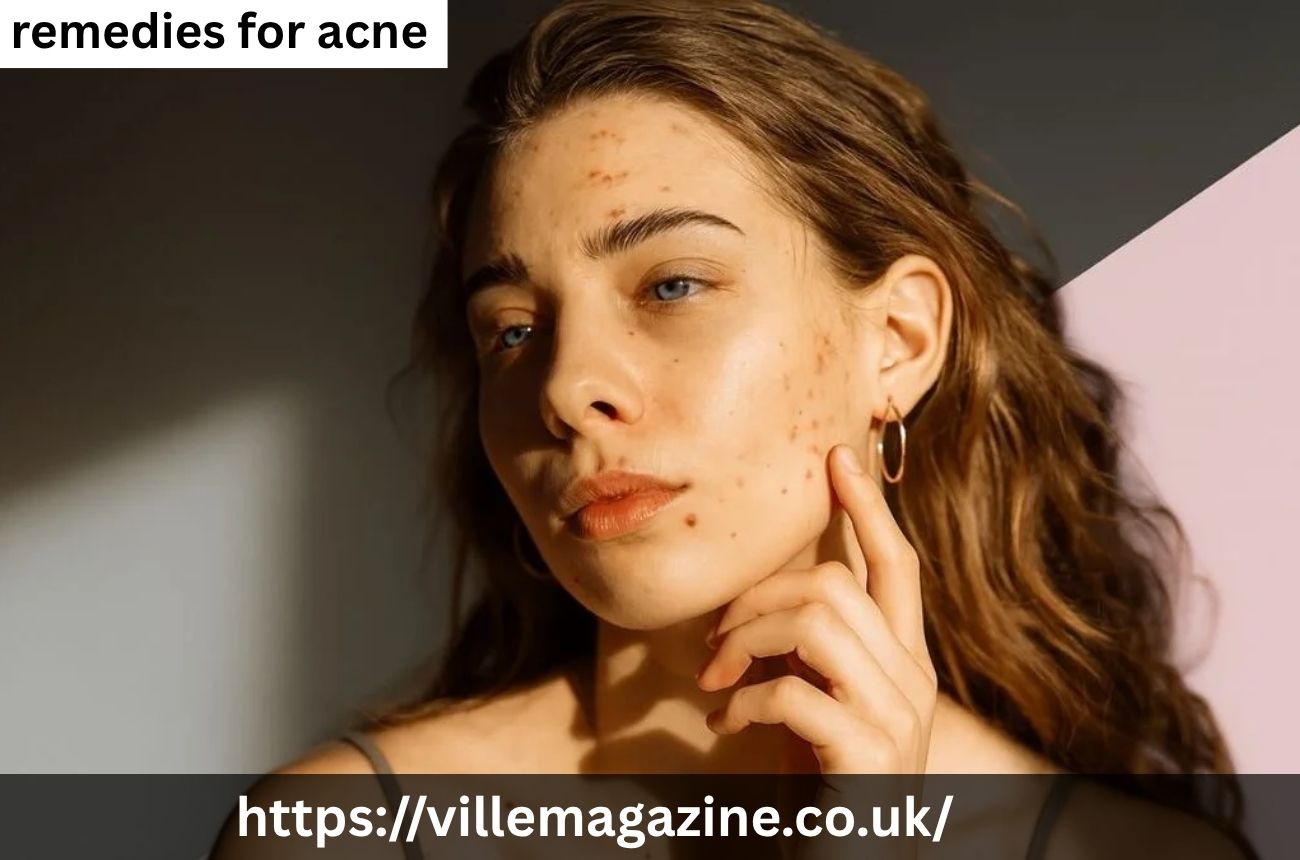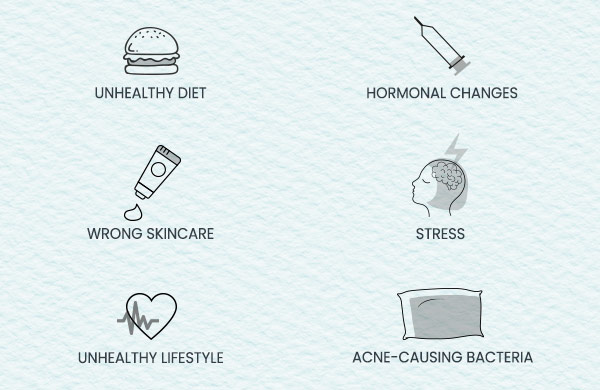Skin Care
Remedies for Acne Scars and Active Breakouts

Acne is more than just a teenage skin problem—it affects people of all ages and can leave behind not only painful inflammation but also long-term scarring. While there are countless treatments available, not all of them are backed by recent studies or real-world effectiveness. In this comprehensive guide, we’ll explore remedies for acne that target both active breakouts and acne scars, using newly discovered approaches, evidence-backed natural solutions, and updated dermatological insights.
Understanding the Root Cause of Acne
Before exploring remedies for acne, it’s important to understand what causes it. Acne is caused when hair follicles become clogged with oil (sebum), dead skin cells, and bacteria. Hormonal fluctuations, poor skincare routines, genetics, diet, and stress can all contribute. Inflammatory acne, including pustules and cysts, can lead to permanent scars if not treated correctly.
New Breakthroughs in Acne Research (2024 Insights)
Recent dermatological studies from 2024 suggest that Cutibacterium acnes—the bacteria long thought to be the main culprit—may not be harmful in all strains. New findings show that the balance of “good vs. bad” strains matters more than simply eliminating all bacteria. This discovery supports microbiome-friendly remedies for acne, including topical probiotics and prebiotic creams designed to maintain bacterial balance.
Fast-Acting Remedies for Active Acne Breakouts

When dealing with active acne, time is of the essence. Among the best remedies for acne breakouts are:
-
Benzoyl Peroxide (2.5%-5%): An effective antibacterial agent that kills acne-causing bacteria and reduces inflammation.
-
Salicylic Acid: A beta-hydroxy acid (BHA) that exfoliates deep inside pores and prevents clogging.
-
Niacinamide (Vitamin B3): Reduces redness, controls oil production, and strengthens the skin barrier.
-
Tea Tree Oil (5% topical): A natural anti-inflammatory and antimicrobial remedy.
-
Azelaic Acid (15-20%): Clinically proven to reduce acne and post-inflammatory hyperpigmentation.
Use these actives cautiously, starting with lower concentrations to avoid irritation, especially for sensitive skin types.
Home Remedies for Acne – What Works in 2025?
Home-based remedies for acne have evolved. Modern DIY treatments include:
-
Green Tea Compress: Rich in polyphenols, green tea reduces inflammation and bacterial growth.
-
Honey and Turmeric Mask: Honey is naturally antibacterial, and turmeric has curcumin, a powerful anti-inflammatory compound.
-
Aloe Vera Gel (Fresh or Cold-Pressed): Soothes the skin and accelerates healing, especially after breakouts.
-
Apple Cider Vinegar Toner (Diluted): Balances pH and fights bacteria, but must be diluted to avoid burns.
While these remedies are natural, they should be patch-tested to avoid allergic reactions.
New Ingredient Spotlight: Bakuchiol
A newly popular alternative to retinol, Bakuchiol is a plant-based compound that offers similar benefits without the irritation. It helps reduce acne by promoting cell turnover, reducing inflammation, and fading scars. It’s gentle enough for daily use and is ideal for sensitive skin types seeking natural remedies for acne.
Remedies for Acne Scars: A Multi-Layered Approach
Treating acne scars is different from treating active breakouts. Depending on the type of scars—atrophic (indented), hypertrophic (raised), or post-inflammatory hyperpigmentation—treatments vary:
-
Chemical Peels (AHA-based like glycolic acid): Stimulate collagen production and even out skin tone.
-
Microneedling: Triggers skin regeneration and helps in fading deeper scars.
-
Laser Treatments (Fractional CO2 or Er:YAG): Resurfacing techniques that reduce scar depth.
-
Silicone Gel Sheets: Effective for raised scars, used consistently over weeks.
-
Topical Vitamin C (20%): Brightens dark spots and boosts collagen.
Combination therapy is often the best approach for noticeable results.
Lifestyle Changes That Enhance Acne Remedies

Even the best remedies for acne won’t work if your lifestyle promotes inflammation. To support clearer skin:
-
Stay hydrated – flushes toxins and supports skin barrier.
-
Low-glycemic diet – reduces insulin spikes that trigger oil production.
-
Get enough sleep – supports skin repair cycles.
-
Manage stress – cortisol triggers acne flares.
-
Clean pillowcases and phone screens – reduce bacteria transfer.
Are Natural Remedies Better than Medicated Ones?
There’s growing interest in natural remedies for acne, especially among those with sensitive skin. While natural solutions like aloe vera, witch hazel, and turmeric are safe and effective for mild acne, moderate to severe cases often require a combination of medicated and natural treatments.
Research now supports integrative dermatology, which combines plant-based and pharmaceutical solutions for long-term results.
Newly Discovered Plant Extracts for Acne (2024 Studies)
Recent studies have highlighted emerging botanical remedies for acne:
-
Licorice Root Extract: Reduces redness and pigmentation.
-
Centella Asiatica (Gotu Kola): Boosts collagen and reduces acne scarring.
-
Neem Oil: Antibacterial and antifungal; helpful for body acne.
-
Mugwort (Artemisia): Calms inflamed skin and reduces acne-related swelling.
These ingredients are now included in serums and toners available in Korean and Ayurvedic skincare.
How to Build a Skin Routine Using Acne Remedies
For effective results, structure your routine like this:
Morning:
-
Cleanser with salicylic acid
-
Toner with witch hazel or green tea
-
Niacinamide serum
-
Lightweight moisturizer
-
Sunscreen (SPF 30+)
Evening:
-
Gentle cleanser
-
Active treatment (benzoyl peroxide or retinoid)
-
Spot treatment
-
Non-comedogenic moisturizer
Use exfoliants (chemical peels) 2x a week max to avoid irritation.
Dealing with Hormonal Acne Naturally

Hormonal acne, especially on the jawline and chin, is often resistant to surface treatments. Effective remedies for acne in this category include:
-
Spearmint Tea: Reduces testosterone levels naturally.
-
Zinc Supplements (30-50mg/day): Controls oil production and reduces inflammation.
-
DIM (Diindolylmethane): Found in cruciferous vegetables; balances estrogen metabolism.
-
Omega-3s: Found in fish oil and flaxseed, help regulate hormones and reduce inflammation.
Always consult a healthcare professional before beginning supplements.
Remedies for Body Acne (Back, Chest, Shoulders)
Acne isn’t limited to the face. Remedies for acne on the body include:
-
Benzoyl peroxide body wash (5-10%)
-
Salicylic acid spray for hard-to-reach areas
-
Exfoliating gloves (2x/week)
-
Wearing breathable clothing
-
Showering after workouts
Fungal acne, which resembles regular acne, requires antifungal treatments—so get a proper diagnosis if breakouts persist.
When to See a Dermatologist
While many remedies for acne can be tried at home, some situations call for professional help:
-
Cystic or nodular acne
-
Acne resistant to OTC treatments
-
Deep pitted or keloid scarring
-
Severe post-inflammatory pigmentation
Dermatologists can offer prescription options, such as oral antibiotics, hormonal therapy (like spironolactone), or isotretinoin.
Conclusion
There’s no one-size-fits-all solution when it comes to acne. The best remedies for acne—whether for active breakouts or lingering scars—require a mix of modern science, natural ingredients, and personalized care. With new discoveries like microbiome-friendly skincare and plant-based alternatives like bakuchiol, individuals have more options than ever. Whether you’re seeking fast relief or long-term skin clarity, understanding your skin type, staying consistent, and choosing evidence-backed remedies will pave the path to healthier skin.
FAQs – Frequently Asked Questions
1. What is the most effective remedy for acne scars?
The effectiveness of acne scar treatments depends on the scar type. For atrophic scars (like ice pick or boxcar), microneedling and laser therapy work best by promoting collagen remodeling. Chemical peels and topical retinoids improve skin texture over time. Post-inflammatory hyperpigmentation responds well to vitamin C, alpha arbutin, and niacinamide. Often, a combination of in-office procedures and home remedies yields the best results.
2. Can home remedies for acne really clear my skin?
Yes, but only if the acne is mild to moderate and you use the remedies consistently. Ingredients like tea tree oil, green tea, turmeric, and aloe vera have proven anti-inflammatory and antibacterial effects. However, more severe acne types may require medicated treatments. Home remedies can also be excellent support treatments to maintain results and reduce reliance on harsh chemicals.
3. What diet changes help with acne prevention?
Research suggests that high-glycemic foods (like white bread and sugary snacks) can spike insulin levels and increase oil production, leading to acne. Dairy, particularly skim milk, has also been linked to breakouts. Incorporating more whole foods, omega-3s (like salmon and walnuts), and antioxidants (like berries and green leafy vegetables) can improve skin health from within.
4. How long does it take to see results from acne remedies?
Topical remedies for acne usually take 4–6 weeks to show visible improvement. Natural remedies may take longer—up to 8 weeks—since they work more gently. In-office procedures for scars, such as microneedling or chemical peels, often show results after 2–3 sessions but require consistent maintenance. Patience and consistency are key to achieving lasting results.
5. Is it safe to combine natural and medicated acne treatments?
Yes, as long as you avoid ingredient conflicts. For example, combining benzoyl peroxide and retinol can cause severe dryness or irritation. However, using natural anti-inflammatories like aloe vera or green tea after medicated treatments can soothe the skin. Always introduce new products one at a time and patch-test to prevent adverse reactions. Consulting a dermatologist for customized treatment layering is ideal.
-

 Celebrity9 months ago
Celebrity9 months agoNick Schmit? The Man Behind Jonathan Capehart Success
-

 Celebrity9 months ago
Celebrity9 months agoChristina Erika Carandini Lee: A Life of Grace, Heritage, and Privacy
-

 Celebrity9 months ago
Celebrity9 months agoTrey Kulley Majors: The Untold Story of Lee Majors’ Son
-

 Celebrity10 months ago
Celebrity10 months agoJamie White-Welling: Bio, Career, and Hollywood Connection Life with Tom Welling
















